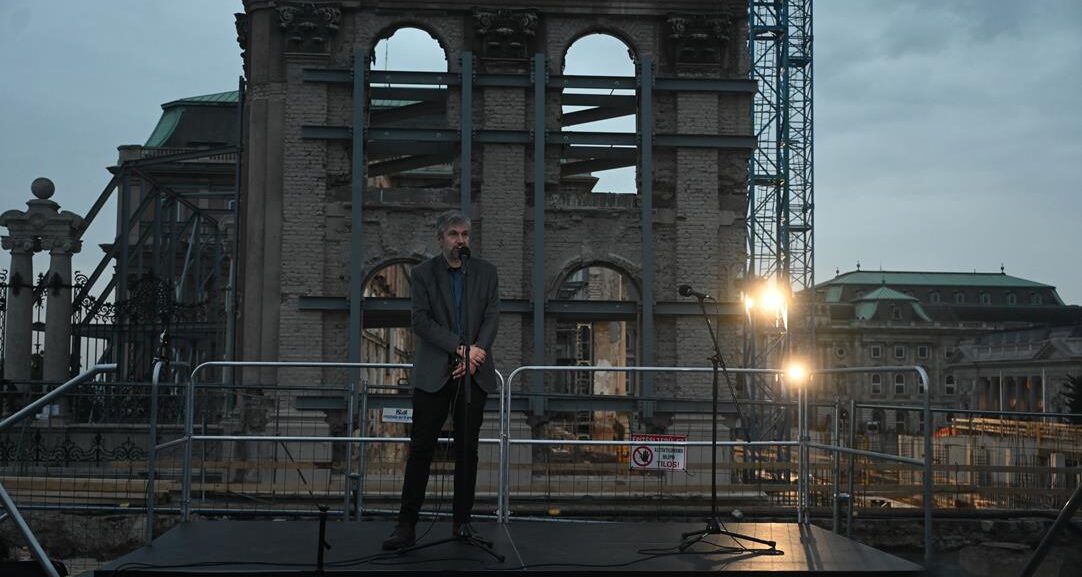Life without freedom is possible but much worse, independent lawmaker Ákos Hadházy said at a demonstration on Elisabeth Bridge in downtown Budapest, held to demand the withdrawal of amendments to the law on the right of assembly. Hadházy told demonstrators that Elisabeth Bridge had become “the second Liberty Bridge”.
“Elisabeth Bridge means the people who know that freedom is not just a phrase or a talking point, that we must act for freedom, that it is worth it,” he said. He called for the protests to last until the government withdraws the law enabling “the use of Chinese-type facial recognition software to surveil our compatriots in opposition”.
Hadházy said he was “personally fed up with shrugging our shoulders when red lines are crossed”. “We went out to protest, we said we wouldn’t allow it, then we went home and did allow it,” he said. He said he “can’t live in a country where the comrades in the police, just like the comrades in China, surveil Hungarian citizens with cameras and use them to punish people at demonstrations the government doesn’t like.”
Blocking the bridge is necessary
He said blocking the bridge was necessary “because our demands are acceptable, important, and because the powers that be are refusing to negotiate”. Resigned judge Adrienn Laczó said: “Judicial independence is important not for the judges but for you, because if courts lose their independence, then there really will be no one between your rights and this all-devouring authoritarianism.”
They went to the Buda Castle
Some demonstrators waved flags with rainbow, EU, Hungarian colours and antifa patterns. There was a rainbow flag with the opposition Democratic Coalition’s logo on it, and Momentum put up a banner on Gellért Hill saying “you can ban us but not the truth”. After the speeches, the protesters marched to the Sándor Palace where they were greeted by a few activists holding a banner calling for a “real regime change”.
At the Sándor Palace, activist Lili Pankotai said she belonged to the generation of students and young people who would “outgrow and topple the regime because this country doesn’t belong to those hanging onto power by their fingernails but those who are coming now, those who believe in freedom, in participation, in the voice that isn’t afraid to say ‘enough!’”
Gáspár Bekes of the Association for a Sustainable Democracy called on people to take a stance “with all secular thinkers” for fundamental rights, tolerance, inclusivity “and a more colourful, more democratic future”.
Lawyer Péter Szepesházi said that before 2010, “we neglected, on a societal level, equality and fraternity, and we were slow to notice that we were being stripped of our freedom.”
Additional speeches
Actress Nóra Rainer-Micsinyei said the right of assembly was a fundamental right of everyone, and “we can’t let them take it away”. “Nations are created by solidarity, and solidarity starts in everyday life, not with curbing the right of assembly or banning the Pride march.”
Gábor Iványi, the leader of the Hungarian Evangelical Fellowship, said that today, “Brussels is the enemy, we are once again Russian vassals, there’s a fight for peace, we again have peace clergy and maybe even a peace loan”. “But there is no peace without justice, without freedom … and the least we can do is not lead a campaign against Ukraine, which is fighting for its life.”
Hadházy and some of the protesters spent the night in the Buda Castle demonstrating:
One of the demonstrators tried to enter the Sándor Palace and later the Prime Minister’s Office, but the police stopped them. Hadházy will hold “public-space MP’s surgery” during the night. Demonstrations are planned to continue on Wednesday afternoon.
Read also:
- Marathon protest against the restrictions on the right of assembly in Budapest – read more HERE
- US Dept of Treasury removes Hungarian Minister Rogán from sanctions list

